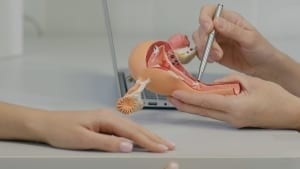 The fallopian tubes resemble thin tubes, up to 14 cm in length, connecting the ovaries to the uterus. The mature egg that breaks away from the ovary moves to the fallopian tube, which is where it usually meets a sperm cell and is fertilized. After this, it continues its path to the uterus, is implanted in it, and it begins to develop into an embryo. The egg’s path through the fallopian tube takes between a few hours and a few days.
The fallopian tubes resemble thin tubes, up to 14 cm in length, connecting the ovaries to the uterus. The mature egg that breaks away from the ovary moves to the fallopian tube, which is where it usually meets a sperm cell and is fertilized. After this, it continues its path to the uterus, is implanted in it, and it begins to develop into an embryo. The egg’s path through the fallopian tube takes between a few hours and a few days.
At times, problems could develop in the fallopian tube that needs treatment. For example, an egg fertilized by a sperm cell could remain in the fallopian tube and begin to develop there – which is defined as an ectopic pregnancy. If the pregnancy continues to develop in the fallopian tube, it will be significantly damaged, since it is not particularly flexible, and it will be damaged from the enlargement and development of the egg.
Pelvic inflammation or blockage of the fallopian tube by fluids could also very much impair its function and even cause infertility.
In such instances and in other cases (e.g. discovery of ovarian cancer that could potentially spread via the fallopian tube to other organs in the body), it is possible that trichotomy (removal of one or both fallopian tubes) will need to be performed. The good news is that such a procedure does not affect the body from a hormonal aspect and that even without fallopian tubes, it is possible to become pregnant using in vitro fertilization.
General information about trichotomy
Trichotomy is performed, as mentioned above when there is a serious problem with the function of the fallopian tubes. It should also be noted here that even blockage of the fallopian tubes with fluids (blood, pus and the like), although it may sound like an apparently simple problem, will in many instances lead to a decision to remove the fallopian tubes, as other treatments that have been performed to date in such instances have not been useful in improving this condition.
Trichotomy is performed today by laparoscopic, minimally invasive approach, via a few small incisions in the region of the lower abdomen, which greatly reduces pain after the operation and significantly shortens the recovery period.
Preparing for the procedure
Trichotomy is, of course, performed under general anesthesia. A few hours of fasting will, therefore, be required before it is commenced. In the days preceding the operation, you will certainly undergo some imaging examinations to obtain an accurate and updated assessment of the condition of the fallopian tubes.
The course of the procedure
As mentioned above, trichotomy is usually performed by a laparoscopic approach. It may be performed as part of a larger procedure (e.g. hysterectomy or oophorectomy in case of cancer), and even as a preventative measure – in women for whom a genetic mutation has been discovered in their body which significantly increases the chance for the development of cancer in the region.
The operation is performed in the region of the lower abdomen, via a few tiny incisions (each a few centimeters long), using special surgical instruments that enable the fallopian tubes to be removed without making a large incision in the abdomen. After the removal, the incisions will be closed, and you will be transferred to the recovery room, and from there to the hospitalization department. The hospitalization will usually continue for up to 48 hours, after which you will be discharged to your home.
General recovery from the operation will take approximately two weeks, after which you will be able to resume your regular activities – but you will still not be able to lift heavy weights, exert yourself or undertake physical exercise. You will be able to resume these gradually, and only after consultation with the medical team. This applies also to sexual intercourse. It should also be remembered that in the initial days after the operation, there may be vaginal bleeding, and possibly also discharge. This will stop after a few days.
Side effects after trichotomy
Infections, prolonged bleeding and damage to internal organs that are adjacent to the fallopian tubes could occur in the framework of trichotomy, but it is important to emphasize: the physicians have extensive knowledge of all that pertains to performing laparoscopic operations, which by their very nature are considered to carry relatively low risk, so that the occurrence of various side effects will be very rare in such cases.
 Patients Log In
Patients Log In 










